Related Research Articles

The treatment of women by the Taliban refers to actions and policies by various Taliban regimes which are either specific or highly commented upon, mostly due to discrimination, since they first took control in 1996. During their first rule of Afghanistan (1996–2001), the Taliban were notorious internationally for their misogyny and violence against women. In 1996, women were mandated to wear the burqa at all times in public. In a systematic segregation sometimes referred to as gender apartheid, women were not allowed to work, nor were they allowed to be educated after the age of eight. Women seeking an education were forced to attend underground schools, where they and their teachers risked execution if caught. They were not allowed to be treated by male doctors unless accompanied by a male chaperone, which led to illnesses remaining untreated. They faced public flogging and execution for violations of the Taliban's laws.
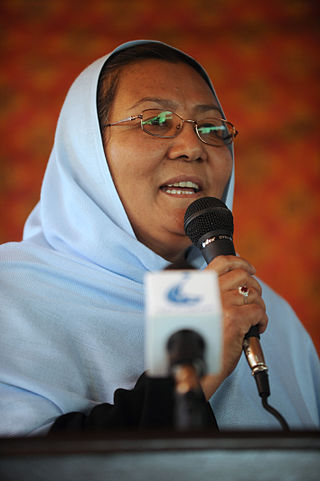
Dr. Habiba Sarābi is a hematologist, politician, and reformer of the reconstruction of Afghanistan after the Taliban first took power. In 2005, she was appointed as Governor of Bamyan Province - the first Afghan woman to become a provincial governor. She had served as Afghanistan's Minister of Women's Affairs and as Minister of Culture and Education. Sarabi was instrumental in promoting women's rights and representation and environmental issues. She belongs to the ethnic Hazara people of Afghanistan. Her last name is sometimes spelled Sarobi.
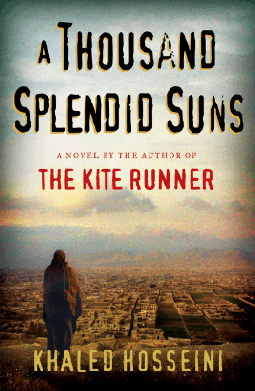
A Thousand Splendid Suns is a 2007 novel by Afghan-American author Khaled Hosseini, following the huge success of his bestselling 2003 debut The Kite Runner. Mariam, an illegitimate teenager from Herat, is forced to marry a shoemaker from Kabul after a family tragedy. Laila, born a generation later, lives a relatively privileged life, but her life intersects with Mariam's when a similar tragedy forces her to accept a marriage proposal from Mariam's husband.
Sex segregation refers to the physical and spatial separation of humans by sex in public or private places. In public places, women are forced to wear the burqa at all times, because, according to one Taliban spokesman, "the face of a woman is a source of corruption" for men not related to them (Non-Mahram).

Suhaila Siddiq, often referred to as 'General Suhaila', was an Afghan politician. She served as the Minister of Public Health from December 2001 to 2004. Prior to that, she worked as the Surgeon General in the military of Afghanistan. As a government minister, she was given the title Honorable before her name. Siddiq was one of the few female government leaders in Afghanistan, and is the only woman in the history of Afghanistan to have held the title of lieutenant general. General Seddiq had worked for the government of Afghanistan since the reign of Mohammed Zahir Shah.

Women's rights in Afghanistan have oscillated back and forth depending on the time period as well as the regime in power. After King Amanullah Khan's attempts to modernize the country in the 1920s, women officially gained equality under the 1964 Constitution. However, these rights were taken away in the 1990s through different temporary rulers such as the mujahideen and the Taliban during the Afghan civil war. During the first Taliban regime (1996–2001), women had very little to no freedom, specifically in terms of civil liberties. When the Taliban was overthrown by the United States following the 9/11 attacks, women's rights gradually improved under the presidential Islamic Republic of Afghanistan. Women were de jure equal to men under the 2004 Constitution.
Robina Jalali, also known as Robina Muqimyar, is a former Olympic athlete who represented Afghanistan at the 2004 and 2008 Olympics and in 30 international events competing in the 100-meter sprint. She competed athletically under the name Muqimyar and ran for a seat in the lower house of Afghanistan's parliament, the Wolesi Jirga, using her family name of Jalali.

The War in Afghanistan was an armed conflict from 2001 to 2021. It began when an international military coalition led by the United States launched an invasion of Afghanistan, toppling the Taliban-ruled Islamic Emirate and establishing the internationally recognized Islamic Republic three years later. The conflict ultimately ended with the 2021 Taliban offensive, which overthrew the Islamic Republic, and re-established the Islamic Emirate. It was the longest war in the military history of the United States, surpassing the length of the Vietnam War (1955–1975) by approximately 6 months.
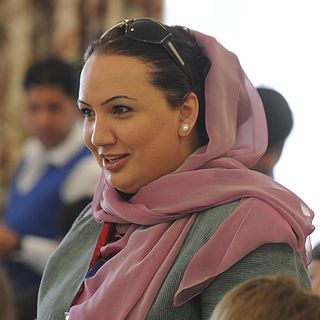
Shukria Barakzai is an Afghan politician, journalist and a prominent Muslim feminist. She was the Ambassador of Afghanistan to Norway. She is a recipient of the International Editor of the Year Award.

Aziz Ullah Haidari was a Reuter's correspondent and photo-journalist in Pakistan. On 19 November 2001, he, along with three other journalists, were kidnapped and murdered by the Taliban on the highway of Sarobi area situated between Jalalabad and Kabul in Afghanistan.

Fauzia Gailani was elected to represent Herat Province in Afghanistan's Wolesi Jirga, the lower house of its National Legislature, in 2005. She won almost 16,885 votes, more than any other candidate in Herat.

Fawzia Koofi is an Afghan politician, writer, and women's rights activist. Originally from Badakhshan province, Koofi was recently a member of the Afghan delegation negotiating peace with the Taliban in Doha Qatar. She is an ex Member of Parliament in Kabul and was the Vice President of the National Assembly.
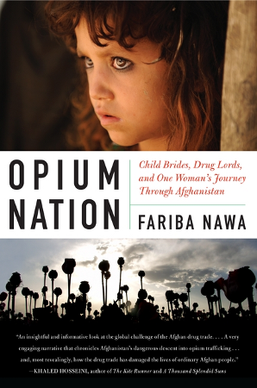
Opium Nation: Child Brides, Drug Lords, and One Woman's Journey Through Afghanistan is a 2011 book by Fariba Nawa. The author travels throughout Afghanistan to talk with individuals part of the opium production in Afghanistan, centering on women's role in it. Generally, reviewers felt that the book succeeded in its portrayal of Afghan culture and the impact of the opium trade on Afghans.
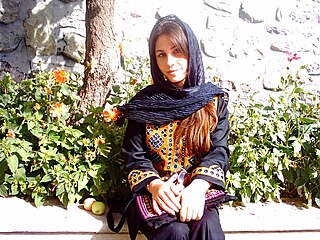
Homeira Qaderi born in 1980 is an Afghan writer, advocate for women's rights, and professor of Persian literature, currently serving as a Robert G. James Scholar Fellow at Radcliffe Institute of Advanced Research, Harvard University.

Zarifa Ghafari is a former female mayor of Maidan Shahr, capital city of the Wardak Province, Afghanistan. Ghafari was one of the few Afghan female mayors, next to the first Afghanistan's mayor, Azra Jafari and Khadija Zahra Ahmadi, and was also the youngest to be appointed, at the age of 24. She is known for her efforts to advance women's rights in Afghanistan. Ghafari was chosen as an International Woman of Courage in 2020 by the US Secretary of State. She has survived three assassination attempts.
Sharbat Gula is an Afghan woman who became internationally recognized as the 12-year-old subject in Afghan Girl, a 1984 portrait taken by American photojournalist Steve McCurry that was later published as the cover photograph for the June 1985 issue of National Geographic. The portrait was shot at Nasir Bagh, Pakistan, while Gula was residing there as an Afghan refugee fleeing the Soviet–Afghan War. Despite the photograph's high global recognition, Gula's identity remained unknown until 2002, when her whereabouts were verified and she was photographed for the second time in her life. Having lived and raised a family in Pakistan for 35 years, Gula was arrested by Pakistani authorities in 2016 and subsequently deported to Afghanistan in 2017 on the charge of possessing forged identity documents. However, in November 2021, Gula was granted asylum in Italy, three months after the Taliban takeover of Afghanistan.
Farahnaz Forotan is an Afghan journalist and women's rights activist. She moved to Iran together with her family during the Mujahideen regime. Farahnaz returned to Afghanistan in 2001, but took refuge in France in 2020 after being included on a Taliban hit list.
Sam Mort is currently Chief of Communication, Advocacy and Civic Engagement for UNICEF Afghanistan, based in Kabul. Officially based in New York, she is currently 'one of the few Westerners left' after evacuations from Kabul. Afghanistan is in the midst of a Taliban offensive, where the insurgents have now taken over from the elected government. She previously announced that Unicef had made a historic deal to have girls educated in the Taliban-controlled areas of the country in 2020.
Zahra Joya is an Afghan journalist. She is the founder of Rukhshana Media, an outlet in Persian and English which she runs from exile.
Pashtana Durrani is an Afghan human rights activist focused on girls' and women's access to education.
References
- ↑ "BBC 100 Women 2021: Who is on the list this year?". BBC News. 2021-12-07. Retrieved 2022-12-16.
- 1 2 3 4 5 6 Nordlinger, Jay (2019-08-08). "An Independent Woman". National Review. Retrieved 2020-03-10.
- 1 2 Pan, Sevara (2018-10-23). "Laila, mother of the addicts". Modern Times Review. Retrieved 2020-03-10.
- 1 2 3 4 5 6 Nordland, Rod (2019-02-15). "She's a Force of Nature, and She Just Declared War on Peace With the Taliban". The New York Times. ISSN 0362-4331 . Retrieved 2020-03-13.
- ↑ Lacey, Liam (2018-04-28). "Review: 'Laila at the Bridge'". POV Magazine. Retrieved 2020-03-14.
- 1 2 3 Kumar, Ruchi (2016-10-13). "In Afghanistan, 'Mother' has her own approach to helping drug addicts". Christian Science Monitor. ISSN 0882-7729 . Retrieved 2020-03-14.
- 1 2 3 4 5 Kumar, Ruchi (2019-01-02). "Inside Mother Camp: the woman tackling Afghanistan's drug problem". The Guardian. ISSN 0261-3077 . Retrieved 2020-03-13.
- ↑ Mehrdad, Ezzatullah (2018-12-21). "Defying the odds as a woman entrepreneur in Afghanistan". Global Voices. Retrieved 2020-03-13.
- 1 2 3 Nordland, Rod; Faizi, Fatima; Abed, Fahim (2019-01-27). "Afghan Women Fear Peace With Taliban May Mean War on Them". The New York Times. ISSN 0362-4331 . Retrieved 2020-03-14.
- ↑ "The War On Afghan Women". Al Jazeera. 2019-08-29. Retrieved 2020-03-14.
- ↑ Nordlinger, Jay (2019-10-10). "Looking Hard at the Afghan War". National Review. Retrieved 2020-03-14.
- ↑ Mengli, Ahmed; Yusufzai, Mushtaq; Smith, Saphora; De Luce, Dan (2019-07-10). "U.S.-Taliban talks inch America closer to withdrawing from Afghanistan". NBC News. Retrieved 2020-03-14.
- ↑ Piene, Bibiana (2019-05-27). "Profilerte journalister til toppmøte i Oslo". Journalisten (in Norwegian). Retrieved 2020-03-14.
- ↑ Oslo Freedom Forum (2019-07-17). "Fighting the Devastating Consequences of War | Laila Haidari | 2019". YouTube. Retrieved 2020-03-13.
- ↑ "BBC 100 Women 2021: Who is on the list this year?". BBC News. 2021-12-07. Retrieved 2022-12-16.
- 1 2 Lodge, Guy (2018-03-23). "Swedish Doc 'The Raft' Leads Winners at CPH:DOX Fest". Variety. Retrieved 2020-03-14.
- ↑ Bennett, Anita (2019-02-10). "'Babysplitters' and 'In Love and War' Among Santa Barbara International Film Festival Winners". Deadline. Retrieved 2020-03-14.